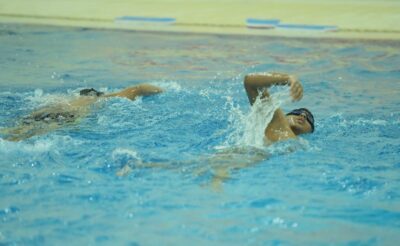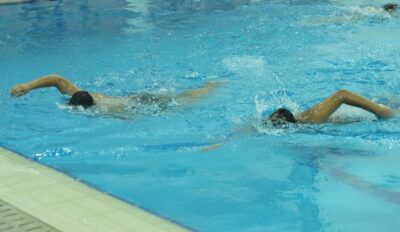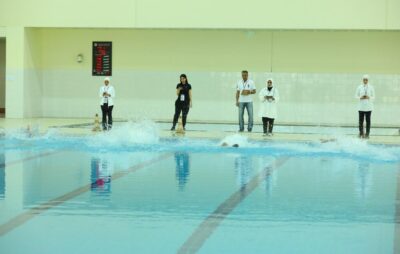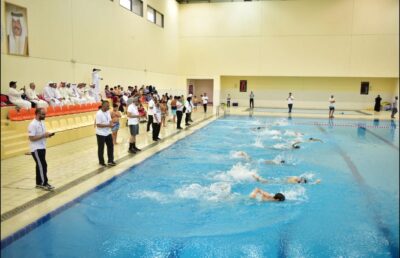SWIMMING
Pentathletes swim 200, 100, or 50 metres depending on their age. Freestyle is the stroke of choice because it is the fastest. The faster the time the more points the athlete earns.
Rules
- Race is by a whistle or start pistol start with a dive after a whistle to take your marks
- After finishing, swimmers must stay in the water until referee signals to exit the pool
- Judges will observe turns and times will be recorded
Clothing
- Swimwear must be in good condition and non-transparent.
- Swimming caps, goggles, and nose plugs are allowed. At international competitions, swimwear must meet approved FINA rules.
Skills
Fitness speed endurance
Scoring
- Swimmers meeting set times will be awarded 250 points above or below each .50 seconds will be awarded +/- 1 point according to the points table for the swim event of the modern pentathlon.
- This points table can be found in the swimming rules section of the UIPM website.
in general
Swimming is a popular and versatile water-based sport and recreational activity that involves moving through water using various techniques. It’s not only a fundamental life skill but also a competitive sport with a rich history.
Swimming has a history dating back thousands of years. It was practiced by ancient civilizations, and swimming as a competitive sport has been part of the modern Olympic Games since their inception in 1896. Competitive swimming includes a wide range of events, such as freestyle, backstroke, breaststroke, butterfly, individual medley (IM), and relay races. Distances vary, from sprints like the 50-meter freestyle to longer races such as the 1500-meter freestyle. Swimming is a prominent sport in the Summer Olympics, attracting top athletes from around the world. Olympic swimming events include various distances and strokes. Swimming offers numerous health and fitness benefits, including cardiovascular conditioning, improved muscle strength, flexibility, and endurance. It’s also a low-impact exercise, making it suitable for people of all ages and fitness levels. Additionally, swimming is an excellent way to cool off on hot days and is often used for relaxation. Beyond competitive swimming, many people enjoy swimming for recreation. This can include leisurely swimming in pools, open water swimming in lakes or the ocean, and activities like water aerobics.
In conclusion, swimming is a multifaceted sport and activity that offers a wide range of physical and mental benefits. Whether you’re a competitive swimmer striving for Olympic glory or someone looking to stay fit and enjoy the water, swimming is a versatile and enjoyable pursuit that caters to people of all ages and abilities.








